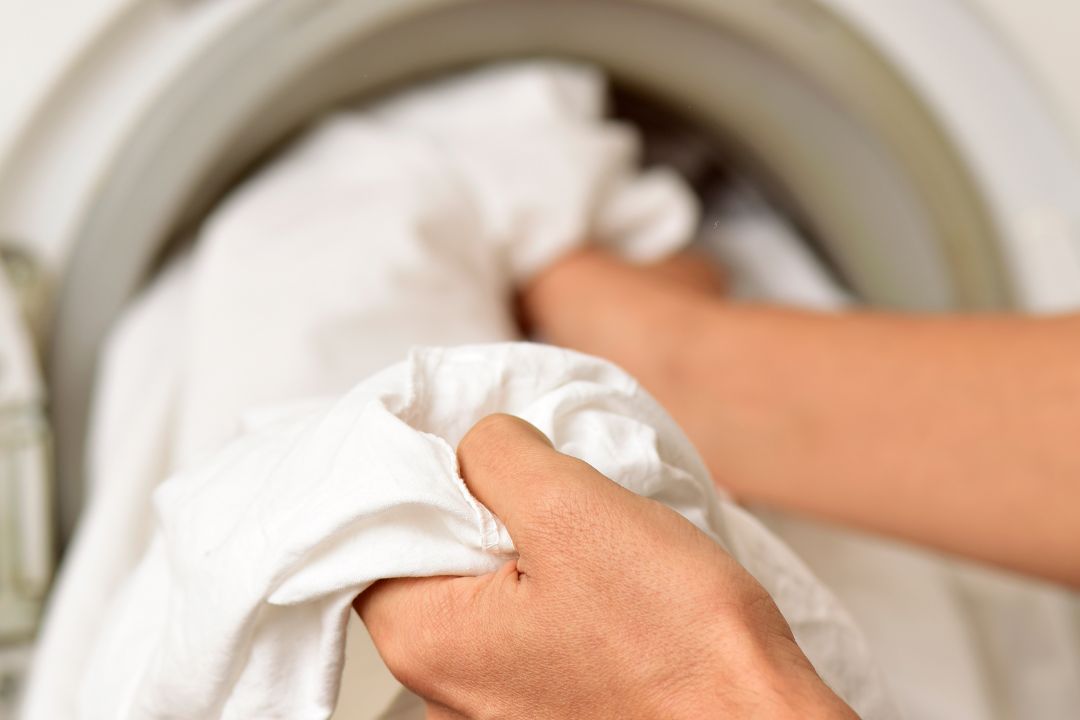You purchased those lovely white cotton bedsheets. They were so fresh and crisp, like the ones found in expensive hotels. You vowed to take proper care of them. You wash them once a week, perhaps twice a week. But somehow, within months, they begin to look. off. That sparkling white gradually becomes dull cream, then a pale yellow. And no amount of detergent can make the yellow magically disappear.
If this sounds like your story, you're in good company. Nearly every person who uses white bedsheets has encountered this issue. The good news: it's not because you're doing something horribly wrong. The bad news: your body and the environment are conspiring to alter your bedsheet color, and it's actually normal.
Your Body is a Chemical Factory at Night
Here's something the average person doesn't think about: while you're sleeping, your body doesn't rest. It sweats, it loses skin cells, and creates natural oils. Even on a chilly evening when you don't feel sweaty, your body secretes moisture. The average person perspires half a liter per night. That's nearly two full glasses of water seeping into your bed sheets when you're dreaming.
But it's not only water. Your sweat is full of salt, fatty acids, and other substances. Your skin continuously secretes sebum, that natural oil that prevents your skin from drying out. When you wriggle and turn in the night, all of this ends up on your cotton bed sheets. Cotton is extremely absorbent, which makes it so soft. But this same property causes it to absorb everything your body secretes.
Eventually, these sweat and body oils don't remain on the surface. They penetrate deep into the cotton threads. When you wash your bedding with regular detergent and regular water heat, you may wash the surface clean, but those oils deep in the fabric? They remain. And as they age and oxidize, they yellow.
The Skincare Routine Nobody Thinks About
Do you use night cream? Body lotion? Face serum? Hair oil? They're all great for your hair and skin, but awful for whitening bedsheets. All of the major skincare products have oils, petrolatum, or other poorly water-soluble ingredients in them. At night, these products transfer onto your pillowcase and sheets.
Your night cream oils combine with your own natural oils to form a difficult-to-remove mixture that even regular washing can't tackle. And if you sleep in wet hair or apply leave-in products, you're putting another transfer layer into the mix. Even if you can't see it occurring, every night your bedsheets are quietly soaking up all of this.
The sneaky thing about it is that you won't even know this is happening at first. The yellowing occurs over time, so slowly that you may not even notice it's occurring until one day you get out your bedsheets and say to yourself, "Wait, weren't these a lot whiter before?

Water Quality Plays a Sneaky Role
The water in your home may be against you. If you have hard water in your area, you're fighting with additional minerals such as calcium and magnesium in each wash. These minerals don't only reduce the effectiveness of your soap. They actually coat the fibers of clothing and form a layer that clings to dirt, oils, and detergent residue.
On repeated washes, this deposit causes a dingy, yellowish hue that's quite difficult to get rid of. You may realize your white towels and clothes suffer from the same issue. That's hard water for you. The minerals form a film on your cotton bed sheets, which makes them appear yellow and dull, even when they are actually clean.
Also, if your region contains water with high levels of iron, you may see yellow or rust-colored stains cropping up out of nowhere. This is the iron in the water coming into contact with the fabric, and this can be very hard to remove.
The Detergent Trap You Didn't See Coming
Here's a touch of irony: using too much detergent actually has the opposite effect and makes your yellowing issue worse. The majority of people assume that more detergent means cleaner sheets, but that's not the case. When you're using too much detergent, your washing machine is unable to rinse it all out. The remaining detergent remains in the fabric, picking up dirt and oils with every usage.
This is a type of detergent buildup and it gradually makes your sheets develop a yellow or grayish color. It is particularly prevalent in liquid detergents, as they are more difficult to thoroughly rinse out than powder. The residue also stiffens or waxes your sheets even when dry.
Fabric softeners add another layer to this problem. While they make your sheets feel soft initially, they coat the cotton fibers with chemicals that can yellow over time, especially when exposed to heat or sunlight.
Sunlight is Both Friend and Enemy
Sunlight is the bleach of nature, and a lot of folks swear by hanging white bedding out in the sun to keep it looking white. And yes, UV light does break up stains and whiten clothing naturally. But here's the catch: excessive direct sunlight, particularly hot afternoon sun, can cause cotton to yellow.
Those UV rays used to whiten out stains can also weaken the cotton fibers themselves. When cotton fibers break down, they become yellowish. If you've noticed old window curtains or fabric that's sat in a sunny window for years, you know that yellowed, aged appearance. The same thing can occur to your bedsheets if they're dried in direct sunlight on a regular basis.
The most important thing is balance. A bit of morning sun is wonderful for refreshing and lightening your sheets. But keeping them outside in hot midday sun for hours can be counterproductive.
Time is the Ultimate Factor
Even if you did everything right, white cotton will naturally fade to a cream or an ivory shade as it ages. Cotton fibers are prone to degrading over time, and the process of aging actually slightly changes their color. Compare it to how paper yellows with age. It's just what happens with organic fibers.
Good-quality 100% cotton bed sheets will last for years, but they won't remain sparkling white forever. The fiber oxidation that occurs naturally means your sheets will slowly change color. This isn't because they're dirty or damaged. It's simply the indication that they're natural, real cotton behaving like natural fibers naturally do over time.
What You Can Actually Do About It
You don't have to accept yellow bedsheets as your fate. There are real ways to prevent and reverse the yellowing. The first step is washing your sheets in hot water when possible. Hot water is much better at dissolving oils and breaking down buildup than cold or warm water. If your sheets' care label allows it, use the hottest water setting.
Add half a cup of baking soda to your wash with your normal detergent. Baking soda is very gentle and will lift oils and residue off the fibers. For added whitening, add half a cup of white vinegar to the rinse cycle. Vinegar dissolves detergent buildup and mineral deposits.
For stubborn yellowing, try soaking your sheets overnight in a mixture of hot water and oxygen-based bleach before washing. This gives the cleaning agents time to penetrate deep into the fibers. Avoid chlorine bleach on cotton if possible, as it can weaken the fibers and cause yellowing over time.
Use less detergent than you believe you require. Refer to the instructions on your detergent bottle and use even a little less than that. Your sheets will be just as clean, and you won't have the buildup issue. Avoid using fabric softener altogether or use it sparingly.
Lastly, wash your bed sheets more often, particularly in summer or if you wear heavy night creams at bedtime. The shorter the time frame that body oils and products have to dry into the fabric, the simpler they are to remove. For most individuals, every seven to ten days is good. Your white cotton bedsheets might not stay pristine white forever, but with these tips, you can definitely keep them looking fresh and bright for much longer.
FAQs
Q: How often should I wash white cotton bedsheets to prevent yellowing?
Wash your white sheets 7-10 days, or more often if you tend to sweat a lot at night or use heavy skin care products. Frequent washing prevents oil and sweat from penetrating deep into the fibers.
Q: Is it OK to use bleach on my 100% cotton bedsheets?
Oxygen bleach is gentle and safe for white cotton sheets. Don't use chlorine bleach because it can eventually weaken cotton fibers and produce yellowing. First, always refer to your bedsheet's care label.
Q: Will hot water ruin my cotton bedsheets?
No, 100% cotton can tolerate hot water nicely. Hot water is actually the best means of stripping body oils and preventing yellowing. Just be sure your sheets are colorfast if they contain any colored trim.
Q: Why do my bedsheets yellow more in summer?
You perspire more in hot weather, so there are more body oils and moisture getting into your sheets. More humidity also makes it more difficult for oils to evaporate, and therefore they penetrate deeper into the fabric.
Q: Do yellow stains on white sheets last?
Not necessarily. New yellowing is usually easily washed away with good techniques such as hot water, baking soda, and oxygen bleach. Extremely old or established yellowing is more difficult to remove but can normally be considerably lightened.
Written by Shivangi Singh


